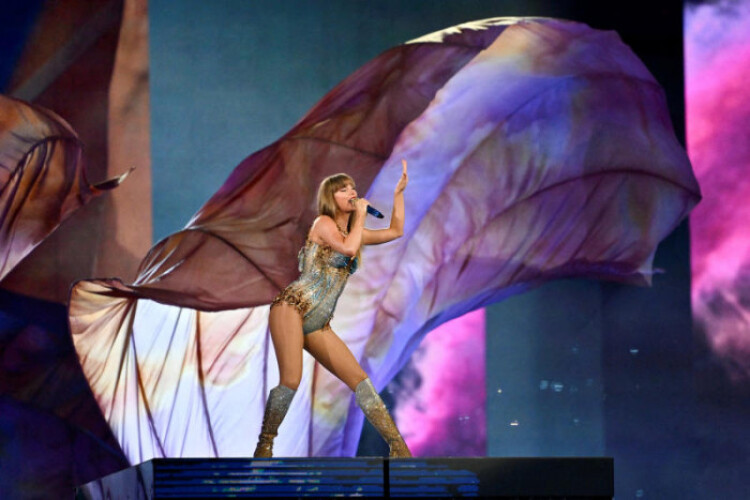
Students and teachers received a surprise on Thursday when celebrities such as singer Taylor Swift and actor Hugh Jackman appeared in the reading section of Hong Kong's Diploma of Secondary Education (DSE) English exam.
About 51,000 candidates sat for the reading and writing papers, with the listening section to be held on Saturday. The exams will end on April 30, with results scheduled to be released on July 16.
Some students were taken aback by the slight changes to the questions, with one DSE candidate saying this year's Paper 1 reading exam was the most difficult he had taken.
"It was tougher than all my school exams and past DSE papers I've practised," said Wilson Tsang, from S.K.H. St Mary's Church Mok Hing Yiu College.
The reading section included an article on celebrity gossip, exploring why it was popular and its possible benefits. It mentioned stars such as Joe Jonas, who recently filed for divorce, alongside Taylor Swift, Ariana Grande, Dalton Gomez and Hugh Jackman as examples.
Beyond typical comprehension skills, students needed to apply understanding of real-world showbiz references to tackle some of the questions.
Tsang found the topics about celebrity gossip unfamiliar and noted that many fill-in-the-blank answers required students to change the word forms to be grammatically correct.
Leung*, an English teacher at a local secondary school, said that two of the topics covered in this year's reading exam were quite unexpected.
"I don't think most schools would have focused on the benefits of celebrity gossip and foraging," she said.
Leung also noted this year's reading exam did not have much writing. Instead, it tested how well students understood the meaning behind words and the main crux of paragraphs.
"It is somewhat similar to a Chinese reading exam in the sense that students have to apply their own understanding to figure out what a term means," Leung said.
Similarly, candidates were tested on their ability to interpret the phrase "an attack on someone's social status".
"Students who know about celebrity news would quickly understand this is not a physical attack but harming someone's reputation," Leung said. "However, students who don't follow such news might find it very difficult to understand the words used."
Flora Ng from Ying Wa Girls' School agreed that Part A of Paper 1 was unusual.
"This portion of the reading exam is usually really simple and straightforward, but sadly this time it's not. Many of my schoolmates felt the same," the 18-year-old said.
DSE candidate Evan Ho echoed the view that the reading exam was challenging in terms of the questions.
"The passages are easy to follow, but the questions require us to find deeper meanings and interpret the information," the 18-year-old from Wong Fut Nam College said.
According to Leung, a number of questions this year were easy to misunderstand, for example question 18, which asked for an example of "difficult feelings".
"The question is asking about how people can 'take breaks' from feeling bad by reading celebrity gossip rather than the difficult feelings the celebrities experience," she said.
On the other hand, students said they felt the writing exam was manageable. They were asked to write an information leaflet for an art club for the compulsory question, and for the other question, they could choose between writing a fictional narrative, a letter to the editor, a discursive essay or a blog post.
Evan appreciated the range of topics and said the compulsory question was relatable for students and easy to connect to social issues. He was also glad he made the decision to set aside 80 minutes for the elective question.
"It is definitely worth spending more time on the long essay," he said.
Alan Chan, a tutor at King's Glory Education Centre, noted this year's candidates needed strong narrative and descriptive skills to ace the writing exam and these were often weaknesses among Hong Kong students.
He also thought it was unexpected no tasks were related to ChatGPT or other technology, given the widespread interest in artificial intelligence.
As for the coming listening exam, Chan suggested candidates pay more attention to format-based questions, such as reports, speeches and various business letters.
"Since the reading and writing exams deviated from standard topics and formats, it's a good idea to dedicate extra time to practising these question types," Chan said.
About 51,000 candidates sat for the reading and writing papers, with the listening section to be held on Saturday. The exams will end on April 30, with results scheduled to be released on July 16.
Some students were taken aback by the slight changes to the questions, with one DSE candidate saying this year's Paper 1 reading exam was the most difficult he had taken.
"It was tougher than all my school exams and past DSE papers I've practised," said Wilson Tsang, from S.K.H. St Mary's Church Mok Hing Yiu College.
The reading section included an article on celebrity gossip, exploring why it was popular and its possible benefits. It mentioned stars such as Joe Jonas, who recently filed for divorce, alongside Taylor Swift, Ariana Grande, Dalton Gomez and Hugh Jackman as examples.
Beyond typical comprehension skills, students needed to apply understanding of real-world showbiz references to tackle some of the questions.
Tsang found the topics about celebrity gossip unfamiliar and noted that many fill-in-the-blank answers required students to change the word forms to be grammatically correct.
Leung*, an English teacher at a local secondary school, said that two of the topics covered in this year's reading exam were quite unexpected.
"I don't think most schools would have focused on the benefits of celebrity gossip and foraging," she said.
Leung also noted this year's reading exam did not have much writing. Instead, it tested how well students understood the meaning behind words and the main crux of paragraphs.
"It is somewhat similar to a Chinese reading exam in the sense that students have to apply their own understanding to figure out what a term means," Leung said.
Similarly, candidates were tested on their ability to interpret the phrase "an attack on someone's social status".
"Students who know about celebrity news would quickly understand this is not a physical attack but harming someone's reputation," Leung said. "However, students who don't follow such news might find it very difficult to understand the words used."
Flora Ng from Ying Wa Girls' School agreed that Part A of Paper 1 was unusual.
"This portion of the reading exam is usually really simple and straightforward, but sadly this time it's not. Many of my schoolmates felt the same," the 18-year-old said.
DSE candidate Evan Ho echoed the view that the reading exam was challenging in terms of the questions.
"The passages are easy to follow, but the questions require us to find deeper meanings and interpret the information," the 18-year-old from Wong Fut Nam College said.
According to Leung, a number of questions this year were easy to misunderstand, for example question 18, which asked for an example of "difficult feelings".
"The question is asking about how people can 'take breaks' from feeling bad by reading celebrity gossip rather than the difficult feelings the celebrities experience," she said.
On the other hand, students said they felt the writing exam was manageable. They were asked to write an information leaflet for an art club for the compulsory question, and for the other question, they could choose between writing a fictional narrative, a letter to the editor, a discursive essay or a blog post.
Evan appreciated the range of topics and said the compulsory question was relatable for students and easy to connect to social issues. He was also glad he made the decision to set aside 80 minutes for the elective question.
"It is definitely worth spending more time on the long essay," he said.
Alan Chan, a tutor at King's Glory Education Centre, noted this year's candidates needed strong narrative and descriptive skills to ace the writing exam and these were often weaknesses among Hong Kong students.
He also thought it was unexpected no tasks were related to ChatGPT or other technology, given the widespread interest in artificial intelligence.
As for the coming listening exam, Chan suggested candidates pay more attention to format-based questions, such as reports, speeches and various business letters.
"Since the reading and writing exams deviated from standard topics and formats, it's a good idea to dedicate extra time to practising these question types," Chan said.






